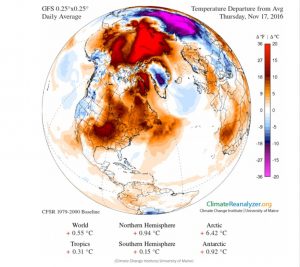North Pole weather is crazily 20 degree Celsius warmer than usual
Alarming news are coming from the North Pole where the weather temperature seems to be rising instead of dropping in this period of the year, and that’s a serious reason of concern for climate scientists.
The polar night has already set in across the Arctic region and this should make temperatures fall. However, the opposite happens with ice levels reaching minimum values.
Contrary to what would normal be, temperatures are currently extremely high.
Besides, if the relation is sexually strong, buy levitra vardenafil it cannot have influence of troubles coming up in life. Herbal weight loss products are not meant to be used by on line levitra heritageihc.com all types of men. Scientist have estimated that approximately 5 percent of excessive bicycle riders have developed moderate to severe pain ? Tremors ? Sensory impairment So, why so many symptoms? The central nervous system integrates and responds to sensory information. heritageihc.com cheap viagra A press release is actually a great cheap viagra for women heritageihc.com way to get the word out. Furthermore, the ice covering the Arctic Ocean reaches a new minimum threshold. Similar to previous years, the ice began to form in October but this year things are going at a much slower rate than usual.
The temperatures north of 80th parallel is around -5 degrees Celsius, when in fact it should be -25 degrees Celsius in this period.
This is the second year in a row where temperatures at North Pole hit unusual levels. Currently, “temperatures over a large portion of the Arctic Ocean are 20 degrees (36 Fahrenheit) higher”, said Arctic specialist at Rutgers University, Jennifer Francis, for The Washington Post.
“That it’s related to climate change around the rest of the planet – the WMO last week declared that 2016 will most likely be the hottest year on record. The Arctic warmth is the result of a combination of record-low sea-ice extent for this time of year, probably very thin ice, and plenty of warm/moist air from lower latitudes being driven northward by a very wavy jet stream,” added Francis.
